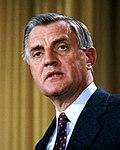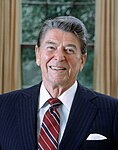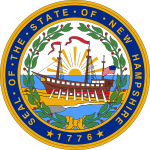|
1984 New Hampshire Democratic presidential primary
The 1984 New Hampshire Democratic presidential primary was held on February 28, 1984, in New Hampshire as one of the Democratic Party's statewide nomination contests ahead of the 1984 United States presidential election. ProcedureCandidates had to receive a minimum of 16.6% to receive delegates. The primary selected 12 delegates, who then selected the remaining 8 delegates on April 15. George Bruno and Holly Abrams, the chair and vice-chair of the New Hampshire Democratic Party, were superdelegates.[1] The contest schedule created by the Democratic National Committee placed the New Hampshire primary on March 6, the same day as the non-binding Vermont primary.[2] However, New Hampshire moved its primary to February 28, in violation of these rules, in accordance with a state law that required it to be held at least one week before any other state's primary.[3] Iowa also violated the rules when it moved its caucus to February 20, in order to be eight days before the New Hampshire primary.[4][5] Walter Mondale stated that he would boycott any state that held its contest before New Hampshire.[5] Nancy Pelosi, chair of the Delegation Selection Compliance Review Committee, stated that the DNC would strip New Hampshire of its delegation.[6] The DNC chose to not penalize Iowa or New Hampshire.[7] CampaignJeanne Shaheen, who managed Jimmy Carter's primary campaign in New Hampshire in 1976 and 1980, managed Hart's campaign with her husband as co-chair.[8] 51% of voters determined who they were supporting before the Iowa caucus. 31% of these voters supported Mondale, 29% supported Hart, 11% supported John Glenn, and 9% supported Jackson. 14% of voters determined who they were supporting the week before the primary, 12% the weekend before, and 8% the day before. Hart won over 57% of these voters. Hart won 44% of the 15% of voters who selected who they supported on the day of the election.[9] 41% of Jackson voters listed Hart as their second candidate in exit polls conducted by CBS News and The New York Times'.[9] ResultsHart won a plurality of the popular vote.[10] Reubin Askew, Alan Cranston, and Fritz Hollings ended their campaigns after their poor results in the primary.[11][12] Hart's victory in the primary propelled his campaign and shifted the standings in the national race as it was initially viewed as a contest between Mondale and Glenn.[13] Hart and Mondale both won 6 delegates in the primary, receiving three delegates from both congressional districts. Hart mathematically received 3.449 delegates in the 1st district and 3.414 delegates in the 2nd district while Mondale received 2.55 and 2.58 delegates in each district.[1] Both candidates had 9 delegates when the remaining were selected on April 15, and 4 delegates were uncommitted. Mary Chambers was selected as chair of the delegation.[14]
References
NotesWorks cited
|
|||||||||||||||||||||||||||||||||||||||||||||||||||||||||||||||||||||||||||||||||||||||||||||||||||||||||||||||||||||||||||||||||||||||||||||||||||||||||||||||||||||||||||







